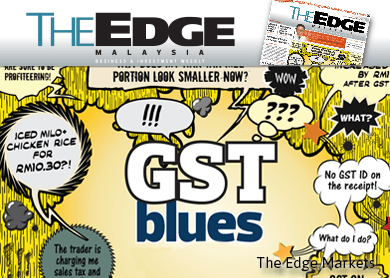
KUALA LUMPUR (Apr 18): Malaysians are questioning the effectiveness of the Price Control and Anti-Profiteering Act as they contend with higher prices since the implementation of the goods and services tax (GST), The Edge Malaysia business and investment weekly (Edge Weekly) reported in its latest April 20-26 issue.
Edge Weekly reported that people appeared not convinced of the Act's effectiveness although theoretically, it should be an adequate deterrent to traders intending to capitalise on the GST to increase prices unreasonably.
"If the flood of complaints over the Internet and in the newspapers is any indication, many Malaysians doubt that the Price Control and Anti-Profiteering Act is effective in curbing profiteering.
"Some have pointed a finger at the Ministry of Domestic Trade, Co-operatives and Consumerism, accusing it of failing in its duty. Prices, they claim, are rising at an unreasonable rate. A bowl of curry noodles or egg tarts from the corner shop cost a lot more now — much more than 6%," Edge Weekly said.
The Price Control and Anti-Profiteering Act forbids any net profit margin rise for 18 months, starting Jan 1. Offenders can be fined at between RM100,000 and RM1 million, depending on the offence.
Malaysia has implemented the GST since April 1 this year. According to Edge Weekly, since Prime Minister Datuk Seri Najib Razak announced the GST implementation in October 2013, Malaysians have been concerned that the tax would cause inflation.
Edge Weekly reported that the government had assured the public that the GST would not lead to higher prices because the Price Control and Anti-Profiteering Act would be strictly enforced.
For a better understanding on how the GST is affecting Malaysians, kindly pick up and read the latest issue of Edge Weekly.
Save by subscribing to us for your print and/or digital copy.
P/S: The Edge is also available on Apple's AppStore and Androids' Google Play.